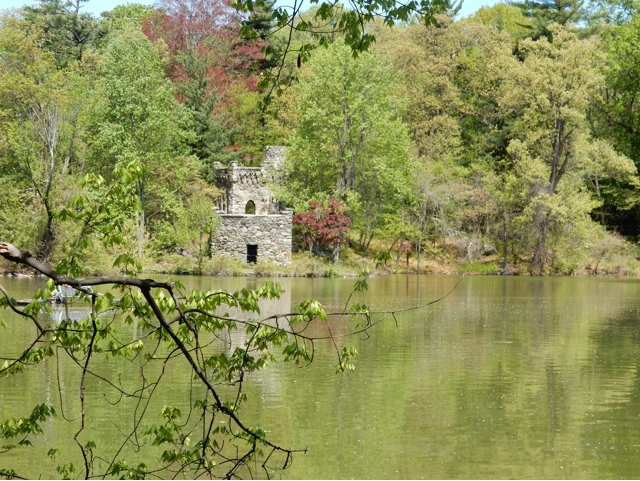Nestled in the rolling hills of northern Delaware, Winterthur encompasses an unrivaled museum of American decorative arts, a magnificent naturalistic garden, and a superlative research library. A former du Pont home, this American trasure reflects the interests and visions of collector and horticulturist Henry Francis du Pont.
Henry Francis du Pont: A Grand Vision
Henry Francis and his sister, Louise, were the only surviving children of Henry and Pauline DuPont. (He was the grandson of Eleuthere Irenee (E.I. Dupont) who's original wealth was inventing gunpowder) Henry studied horticulture at Harvard, and in 1903 , one year after his mothers death, assumed the duties of household management at Winterthur and began his lifelong work in the garden.
In 1916 he married Ruth Wales, and they had 2 daughters. By 1925 the estate included farms, extensive flower gardens, greenhouses, a golf course,railroad station, and post office. H.F. inherited the property in 1926 and during the next 43 years further developed the farmland, raised a prizewinning dairy herd, collaborated with landscape architect, Marian Coffin to blend the garden into the 2,600 acre landscape, and added a wing to the house to display his collection of American antiques.
In 1951, he and his family moved to a smaller house on the property, and he opened his home as a museum.
Pierre S. du Pont (cousin of Henry Francis - Winterthur) founded Longwood Gardens - intricate fountain systems, to the meticulous garderns to the architectural grandeur, awe-inspiring discoveries filled our visit. In 1906, 36 year old Pierre du Pont purchased the farm primarily to preserve the trees.
Pierre was born in 1870 . His early years were influenced by the area's natural beauty and the du Pont
family's long tradition of gardening. In addition to his travels, Pierre also built an impressive record of success in corporate America. He visited many gardens in his travels, and his style would draw heavily on Italian and French forms.
In 1907 , Pierre laid out his first garden - the 600 - foot-long Flower Garden Walk, which is one of the most popular gardens. 1n 1921 he built the stunning Conservatory. All of the systems were hidden in tunnels so as not to detract from the grandeur of the glass-covered peristyle and surrounding rooms.
From 1925-1927 he constructed a water garden in a low-lying, marshy site. The inspiration was the Villa Gamberaia near Florence. In 1937 Pierre set op the Longwood Foundation, and in 1946 the government gave approval for the Foundation to operate today "for the sole use of public for purposes of exhibition, instruction, education and enjoyment".
OUR LADY OF CZESTOCHOWA
According to tradition, the original icon located in Poland was believed to be pained by St. Luke the Evangelist, on the top of a table build by Jesus. As St. Luke pained, he listened to Mary tell of the life of her son; information he used later in writing his Gospel .
She is the paton saint of Poland. Despite the German capture of Poladn during World War II, thousands of pilgrims secretely journed to visit the image and implored her protection.
We visited the shrine to Our Lady of Czestochowa located in Doylestown, Pa. on our way to the Hudson Valley.

SUNNYSIDE - THE HOME OF WASHINGTON IRVING - THE FIRST MAN OF LETTERS
Sunnyside, the home of celebrated author , Washington Irving, know as American's first man of letters. Set among rolling hills, a babbling brook, and the purple and white flowers of wisteria that climb all the way up to the gabled roof, Sunnyside reminds one of the "Legend of Sleepy Hollow" and "Rip Van Winkle".
Washington Irving was an author, historian and diplomat who pursued a full time career in writing, and was the first American to do so. He also served as the first Ambassador to Spain from 1842-1846. (He spoke several languages fluently, Spanish , French and Italian). He wrote a multivolume biography of George Washington, as well as a "A History of New York" which is credited with giving rise to the modern American Christmas.
PHILIPSBURG MANOR
The tour is designed to give visitors an appreciation of the manual labor required to run an international trading company in the 19th century. The Philipse family was one of the earliest and largest slaveholders in the northeast. The original land was a Dutch grant of 52,000 acres. They used tennant farmers and slaves to run the farm. After harvest they put their wheat through the grist mill, into barges that went down the Hudson to be loaded into ships for export. After the American Revolution, since they were patriots, they lost their land.
Karen lived in Weschester County for 30 years, and we visted the theatre in Irvington where she was President. Also, the pond in her neighborhood where she used to walk.







































 My favorite orchid, The Lady Slipper.
My favorite orchid, The Lady Slipper.



























No comments:
Post a Comment